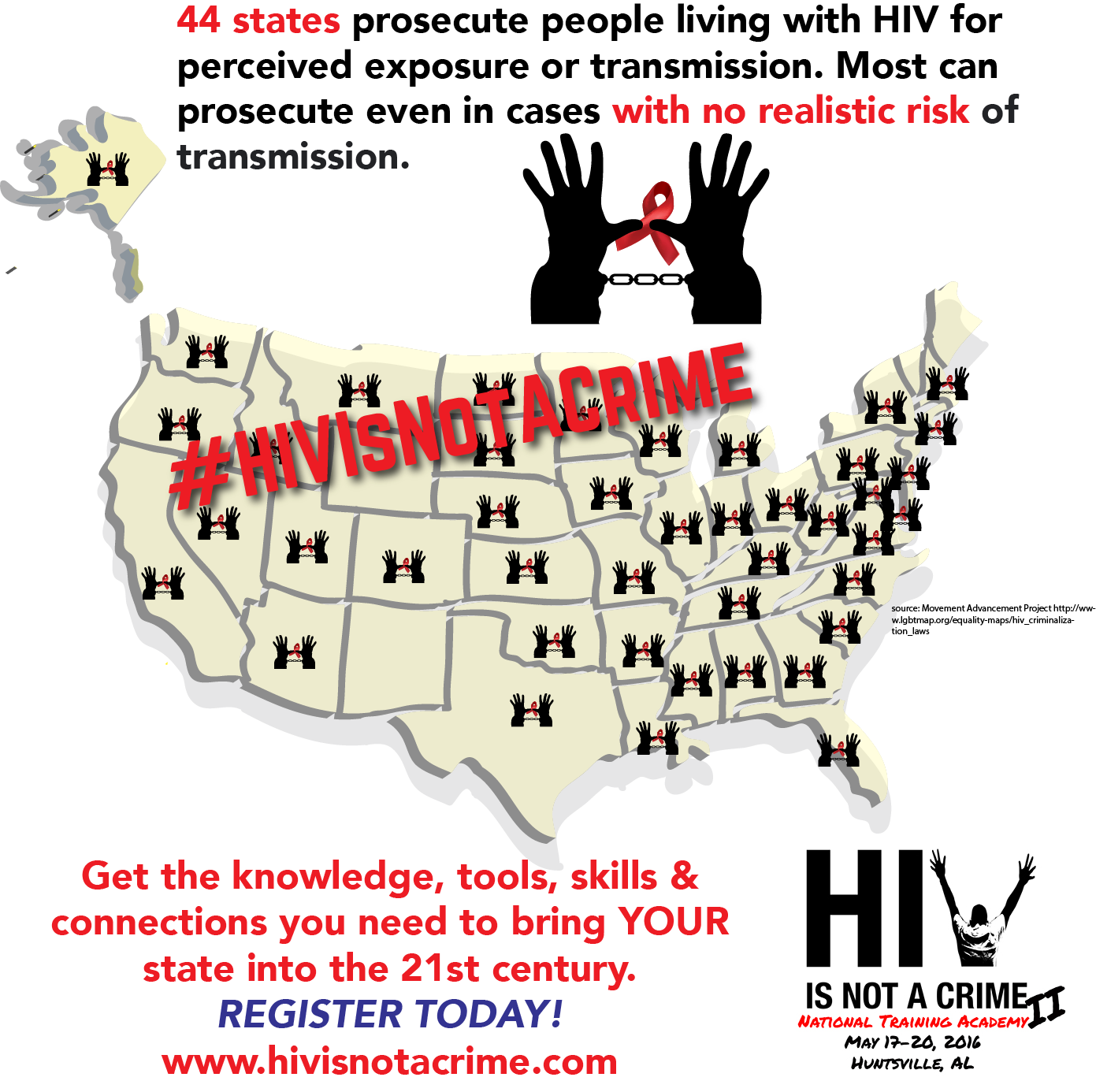**MEDIA ADVISORY FOR TUESDAY, MAY 17**
Contact: Jennie Smith-Camejo, jsmithcamejo@pwn-usa.org, 347-553-5174
Even as a bill repealing Colorado’s HIV criminalization laws awaits the governor’s pen, much work remains to be done to bring laws up to date with current science in at least 33 states.
Eleven states have laws on the books that can send people living with HIV to prison for behaviors (such as biting and spitting) that carry virtually no risk of transmitting HIV. Forty-four states have prosecuted people living with HIV for perceived exposure or transmission; most states permit prosecution even when no transmission has occurred, and actual risk is negligible.
In Texas, a man living with HIV is currently serving a 35-year sentence for spitting. In Idaho, Kerry Thomas is serving 30 years for allegedly not disclosing his HIV status to a partner – despite the fact that he took measures to prevent transmission, including using a condom and taking medications to maintain an undetectable viral load. Kerry Thomas’ accuser never acquired HIV. Yet his appeal was recently denied, demonstrating that current science continues not to matter to the courts.
“These laws make disclosure harder. Because we so fear the punishment, we just keep things bottled up inside,” says Monique Howell-Moree, who was prosecuted under a US military non-disclosure law and would have faced 8-12 years if convicted. “I didn’t know the best way to disclose … Had I had the support and knowledge that I have now back then, I would most definitely have done things differently.”
In her HIV/AIDS platform and in a recent meeting with activists, U.S. presidential candidate Hillary Clinton called for “reform[ing] outdated and stigmatizing HIV criminalization laws.” Sen. Bernie Sanders’ campaign has said the candidate is also “absolutely opposed” to these laws, according to the Washington Blade. The confluence of outdated laws, unjust prosecutions and profound disparities is bringing advocates and activists from 34 states and 4 countries together for the second national convening dedicated exclusively to strategizing to fight back in the name of human rights and public health.
WHAT: HIV Is Not a Crime II National Training Academy WHERE: University of Alabama, Huntsville WHEN: May 17-20, 2016
The Training Academy is co-organized by SERO Project and Positive Women’s Network-USA, two national networks of people living with HIV. It comes on the heels of a major victory in Colorado, where through the dedicated efforts of a group known as the “CO Mod Squad” (“mod” refers to “modernization” of the law), led by Positive Women’s Network-USA (PWN-USA) Colorado, a bill was passed last week that updates laws to take account of current science and eliminates HIV criminalization language.
“With people living with HIV leading the way and our allies supporting us, we were able to do something many thought we couldn’t,” said Barb Cardell, co-chair of PWN-USA Colorado and one of the leaders of the successful efforts. “The law now focuses on proven methods of protecting public health — like education and counseling — while discarding the language of criminalization, which actually discourages testing, treatment and disclosure.”
“This law represents real progress for Coloradans, regardless of their HIV status,” she added. At the Training Academy this week, Cardell will share some highlights and lessons learned from the CO Mod Squad’s experience.
Keynote speakers at the Training Academy include Mary Fisher, who stunned the audience at the 1992 Republican National Convention with a speech about her experience as a woman living with HIV; Joel Goldman, longtime advocate and managing director of the Elizabeth Taylor AIDS Foundation; and Colorado state senator Pat Steadman, the senate sponsor of the bill just passed repealing HIV criminalization in his state. Session topics will explore best practices for changing policy, and will consider the intersections of HIV criminalization with issues ranging from institutional racism to transphobia, criminalization of sex work, mental illness and substance use, and overpolicing of marginalized communities.
“The goals of the Training Academy go beyond giving advocates the tools and know-how they need to change policy, to deepening our collective understanding of the impact of these laws and why they are enforced the way they are,” said Naina Khanna, executive director of PWN-USA. “We hope participants will leave better prepared to effect change by thinking differently, forging new partnerships and ensuring communities most heavily impacted by criminalization are in leadership in this movement.”
Several spokespeople will be available to address questions from media. You may contact the individuals below directly or through Jennie Smith-Camejo (contact information above):
- Sean Strub, Director for SERO Project. (646) 642-4915; sean.strub@seroproject.com
- Naina Khanna, Executive Director for Positive Women’s Network – USA. (510) 681-1169; nkhanna@pwn-usa.org
- Robert Suttle, Assistant Director for SERO Project and HIV criminalization survivor from Louisiana. http://seroproject.com/video/robert-suttle/ (646) 589-2346; Robert.suttle@seroproject.com
- Monique Howell-Moree, HIV criminalization survivor from South Carolina. http://seroproject.com/video/monique-moree/ (843) 345-8433; moniquemoree@gmail.com
- Arianna Lint, founder and CEO of Translatin@ Services and Ariann@ Center, transgender rights and HIV activist. (786) 600-1915; ariannau@translatinacoalition.org
- Barb Cardell, PWN-USA Board Member, leader of CO Mod Squad coalition behind successful Colorado bill. (303) 946-2529; barb@barbcardell.com
Check the training academy’s website and social media for the latest developments on the event:
- www.hivisnotacrime.com
- www.facebook.com/HIVIsNotACrimeConference
- www.twitter.com/HIVIsNotACrime
- Follow the hashtag #HIVIsNotACrime
###





[…] said Barb Cardell, PWN-USA Board Chair, co-chair of PWN-USA Colorado and a presenter at the HIV Is Not a Crime II Training Academy. “With people living with HIV leading the way and our allies supporting us, we were able to […]
[…] said Barb Cardell, PWN-USA Board Chair, co-chair of PWN-USA Colorado and a presenter at the HIV Is Not a Crime II Training Academy. “With people living with HIV leading the way and our allies supporting us, we were able to […]